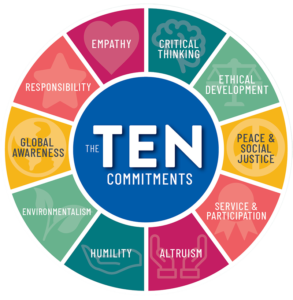Spring into Action: 3 Ways to Be a Better Humanist
When I first discovered humanism, I struggled with an overwhelming sense of urgency to put my philosophy in action. I could not quite shake the feeling that I wasn’t doing enough to “be a good humanist.” After much reflection, my opinion has shifted to the belief that humanism is not just about being, it can also be a practice that can support a way of life. Throughout my journey of converting philosophy into ways I can live my life, I focused on three of the Ten Commitments of humanism from the American Humanist Association. The three commitments that will be explored within this article are: service and participation in the community, global awareness, and humility.
“Service and Participation” was the first commitment that I chose to work on. This is because helping and being part of the community is so closely linked to the core philosophies of humanism and it was the easiest commitment to turn into simple, actionable tasks. Service is defined as helping or doing work for someone. I chose to focus my service on my community by opening and utilizing a library card. Opening a library card may seem basic or even useless to other people. However, opening a library card and actually using it is one of the easiest but also most effective ways of becoming part of your community and getting to know the many people that make it up. Having access to a library card not only gives the owner access to a plethora of both digital and physical resources, but it also allows you and others to share. Most libraries include the following resources for adults in need: career workshops, arts classes, access to the internet, English language support, access to digital and physical books, and nonprofit support. Libraries are also amazing resources for children. Access to a library often allows children access to: story times, homework assistance, technology support, college preparation, resume workshops, and volunteer opportunities. Other than classes or other resources that are commonly thought of, anyone who may be experiencing homelessness or extreme poverty can use libraries for physical shelter during the day, access to the internet, bathrooms, or any of the resources listed above. All of these activities mean that libraries provide opportunities to volunteer and interact.
I also worked on participating in the community in other ways. Normally, I pride myself on being a homebody due to my asocial nature. However, these past few months I really pushed myself to go outside, enjoy public services, and connect with other humans or nature. The first method of connection that I tried was joining humanist Facebook groups, reading other articles from the American Humanist Association, and talking to people that I already know. Even though there was not much change from what I was doing previously, the conscious effort was affirming. I then used this affirmation to build up my confidence to branch out into more difficult methods of communication. For me, that looked like joining a free collage club where I gathered with others, we shared social media, we had amazing conversations, and we made art with each other. The two sessions of collage club that I attended were tremendously helpful to me because it provided a “third place” outlet which is so lacking in today’s society. A third place is any place where people can talk with others or relax that is not at work or at home. While my third place was a collage club, this could be anywhere for those who are interested in trying to find ways to build upon their humanistic practice. Common free and accessible third places include parks, coffee shops, gyms, recreation centers, and sporting events.
Now that I had found a local community, I felt ready to venture towards my second commitment, “Global Awareness”. Because I live in a relatively diverse city, focusing on global awareness was easy for me. For example, there are big cultural and religious festivals, diverse restaurants, and people who have backgrounds from around the world for me to connect with. However, I used to live in a small town which would have made these things impossible. I will try to include some small-town friendly options for those who need it. For those who live in big cities, try to look for monthly or weekly activities from your cultural center or history museum. Here are a few activities that I attended to expand my participation in global awareness: attending a symphony orchestra, viewing cultural dances from Mexico and Jamaica, and experiencing a live art session from artists around the world. For those in smaller towns where these options may not be accessible, I recommend watching content creators from around the world or using the internet to learn how to cook an international dish, listen to international music, or learn a different language.
Lastly, I wanted to focus on a third commitment, “Humility”. Humility is important to me because it reminds me to stay grounded and give myself the grace that I so willingly give others. The actionable tasks that I broke humility down into were: creating a To-Do list, journaling my experiences, reflecting on my glows and grows. (Glows are positive things that occurred in a day or positive actions taken.
Grows are areas that may need improvement or change.) I chose these three tasks because they were simple, and expanded onto things that I already had in place.
In conclusion, humanism is not just something to be, it can also be things to do. I have found that breaking down the humanistic core values into small, free or cheap, actionable tasks worked well for me. For those of you that are interested in completing a journey similar to mine, try working on one or two actions that can be completed daily or weekly.

